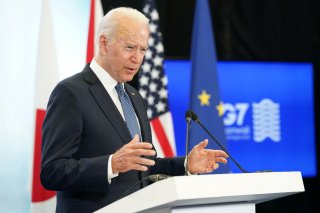The Versatile Test Reactor is Crucial for U.S. Global Leadership in Nuclear Energy
The United States has an opportunity to regain its leadership role in nuclear reactor designs and fuel.
The U.S. House Appropriations Committee recently decided to zero out the budget for the Versatile Test Reactor (VTR), which has grave ramifications for U.S. national security and the fight against climate change. The VTR is a U.S.-based test reactor that would play a crucial role in supporting the continued research and development of advanced nuclear technologies that lead to continuous technology improvements. Depending on funding, it could be fully operational by 2026. The Biden administration has consistently noted the importance of the next generation of nuclear technologies in putting the United States on a path to meet its decarbonization targets; the VTR is crucial for enabling innovation and the widespread commercialization of advanced reactors and the fuel necessary to power them.
If the United States gives up the chance to build the VTR, then it could be another step to relinquishing the mantle of global leadership in advanced nuclear technologies and likely ceding that mantle to Russia, which has advanced testing capabilities through its sodium-cooled reactor, the BOR-60. Additionally, Russia is building a high-flux fast test reactor, known as the MBIR. Allowing the only fast neutron test facility in the world to reside in Russia—without building a similar capability in the United States—could also enable the Russian nuclear energy sector to leapfrog over the U.S. nuclear energy industry, since it would help Russia commercialize its next-generation nuclear technologies faster and provide the capability for long term innovation. The use of Russian facilities presents significant challenges to U.S. companies, so it is crucial that the United States continue to invest in a domestic fast neutron testing capability. Moreover, a U.S.-based VTR would attract cooperation—and possibly funding—from U.S. civil nuclear allies, which have indicated an interest in monetary contributions for shared research or paying for use of the VTR facility.
As the United States seeks to establish itself as the global leader of the energy transition, it is crucial that it maintain its ability to innovate in the field of advanced nuclear technologies, especially so that the first-of-a-kind reactors that are currently in development stages do not ultimately become the only-of-a-kind. The United States was the first in the world to develop nuclear energy technology and must recapture its status as the global leader in the field. China has taken the lead global role in producing much of the materials for the global energy transition, including solar panel manufacturing and in the production of critical minerals. Now, the United States has an opportunity to regain its leadership role in nuclear reactor designs and fuel.
Global demand for advanced nuclear energy technologies is predicted to triple by mid-century, and the country that invests in the development of these technologies now will be the leader of the international civil nuclear market decades from now. If the United States walks away from global leadership in nuclear energy now, then it is unlikely to ever regain its status as the world’s top exporter of nuclear energy technologies, and the United States will lose its ability to influence global nuclear safety and nonproliferation standards. Nuclear energy innovation has enjoyed bipartisan support in the halls of Congress, and U.S. policymakers must recognize the importance of the VTR to U.S. nuclear energy leadership.
Ambassador (ret.) Thomas Graham, Jr. (@tgrahamjr) is Chairman of the Board of Directors of Lightbridge Corporation, and former General Counsel and Acting Director of the US Arms Control and Disarmament Agency. He is also Co-Chairman of the Atlantic Council Nuclear Energy and National Security Coalition.
Admiral (ret.) Richard W. Mies served as the fourth Commander-In-Chief of US Strategic Command. He is Co-Chairman of the Atlantic Council Nuclear Energy and National Security Coalition.

